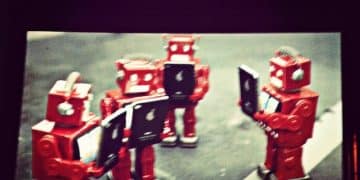AI in Network TV Scriptwriting: Innovation or Formula?

Network TV’s use of AI in scriptwriting is a subject of debate, with some viewing it as a tool for boosting creativity and efficiency, while others fear it could lead to a homogenization of content and a decline in originality.
The rapidly evolving landscape of artificial intelligence is now making its presence felt in an unexpected arena: network television. As AI tools become increasingly sophisticated, many are wondering about Network TV’s use of AI in scriptwriting: Is It Enhancing Creativity or Creating Formulaic Shows? Today, we will see how AI is changing the network TV landscape.
AI Scriptwriting: The Dawn of a New Era in Network TV
The integration of Artificial Intelligence (AI) into network television scriptwriting marks a significant shift in how shows are conceived, developed, and produced. This transformation promises greater efficiency and new creative avenues, but also raises concerns about originality and the human element in storytelling. Let’s delve into the unfolding dynamics.
The Promise of AI in Scriptwriting
AI offers capabilities that can drastically reduce the time and resources required for script development. The ability to analyze vast data sets to predict audience preferences is alluring and a driving force in its adoption.
But What Are the Dangers of AI Scriptwriting?
There are growing concerns that over-reliance on AI could lead to a homogenization of content, with shows tailored to algorithms rather than original creative thought. This raises critical questions about the future of storytelling on network TV.
- AI can analyze audience data to predict successful themes.
- AI tools can generate basic plot outlines and scene structures.
- AI can assist in refining dialogue to match target demographics.
- AI enables faster script revisions and adjustments.

In essence, while AI presents numerous advantages in terms of efficiency and data-driven content creation, it also brings the risk of sacrificing the unique, unpredictable creativity that has traditionally defined the best of network television. Maintaining a balance between AI assistance and human ingenuity will be crucial in navigating this new era.
How AI is Currently Used in Network TV Scriptwriting
AI is not yet writing entire episodes of network TV shows. But, it’s playing an increasingly significant role behind the scenes. Producers are still trying to navigate how to best use AI.
Generating Ideas and Outlines
AI algorithms can quickly generate plotlines, character concepts, and even full outlines based on successful shows. It can provide a starting point for writers or give them insights into audience interests.
Refining Dialogue and Tone
AI can analyze scripts for tone and cadence, suggesting improvements to align dialogue with specific characters or target demographics. This ensures consistency and enhances audience engagement.
However, the current application is not without its limitations. AI-generated content often lacks the emotional depth and nuance that comes from human experiences. It can also struggle with originality, tending to regurgitate existing tropes and storylines. The challenge lies in leveraging AI’s capabilities while preserving the authenticity and creativity of human writers.
The Impact on Writers: Collaboration or Replacement?
The advent of AI in scriptwriting has triggered concerns among writers about job security and creative control. Will AI become a tool to augment their abilities, or will it replace them altogether?
AI as a Writing Assistant
Many see AI as a powerful tool that can handle mundane tasks such as research, outlining, and basic drafting. This frees up writers to focus on the creative aspects of storytelling, such as character development and plot twists.
But could AI Replace Writers in Network TV?
There’s fear that AI could be used to cut costs by reducing the number of writers needed for a project. This is probably the most significant source of anxiety among screenwriters.
- AI can automate repetitive tasks, freeing up writers’ time.
- AI insights can lead to data-driven creative decisions.
- Collaboration can result in innovative storytelling approaches.
Ultimately, the future likely lies in collaboration. AI can provide a solid foundation and enhance efficiency, but human writers will need to bring the emotional depth, originality, and unique perspectives that AI currently lacks. This partnership can lead to a new era of creativity in network television, provided that the value of human input is recognized and preserved.

E-E-A-T and the Role of AI in Trustworthy Content
In the pursuit of high-quality and credible content, Experience, Expertise, Authoritativeness, and Trustworthiness (E-E-A-T) are paramount. So where does that leave AI?
How Does the Experience Factor Impact Audience Reception?
Personal experiences shared by writers or actors can deepen stories. The impact of real-world experience is profound and hard to replace.
The Impact of Using AI When Lacking Experience
Relying too heavily on AI may sideline insights from writers with extensive backgrounds in producing successful shows, potentially diminishing the quality and authenticity of network TV.
While AI can aggregate and analyze data to improve content, it misses the intuitive understanding and emotional connection that human expertise provides. Maintaining a balance is critical to ensuring network TV content remains authoritative, trustworthy, and richly informed by human experience and expertise.
Creativity vs. Formulas: Can AI Strike the Right Balance?
The core challenge of integrating AI in network TV scriptwriting lies in striking a balance between data-driven formulas and genuine creativity. Does this mean network TV might become boring in the future?
The Allure of Predictable Success
AI’s ability to predict audience preferences tempts producers to create shows that are algorithmically designed for success. This can lead to content that is predictable and lacks originality.
The Value of Original and Unique TV Shows
Audiences are increasingly craving authentic and innovative stories that challenge conventions and offer fresh perspectives. Over-reliance on safe bets can result in viewer fatigue.
Network television must embrace the risk of failure, encouraging writers to push boundaries and explore unconventional narratives. By combining AI’s analytical power with human ingenuity and a willingness to take creative risks, network TV can deliver content that is both engaging and innovative.
The Future of AI in Network TV: Predictions and Possibilities
Looking ahead, AI is poised to revolutionize network TV scriptwriting in ways we can only begin to imagine. So, how will the landscape of Network TV change?
AI-Powered Interactive Storytelling
AI will allow viewers to influence plotlines and character development in real-time. This can result in highly personalized entertainment experiences.
Using AI For Global Content
AI can help create shows that appeal to diverse cultural backgrounds. This can drastically change ratings for some shows.
The key to unlocking AI’s full potential lies in prioritizing human creativity and ethical considerations. By focusing on augmentation rather than replacement, network television can harness the power of AI to enhance storytelling while preserving the originality, diversity, and emotional resonance that make TV shows so special. This will ensure that the future of network TV is marked by innovation and creative excellence.
| Key Aspect | Brief Description |
|---|---|
| 🤖 AI in Scripting | AI aids in plot generation and dialogue refinement. |
| ✍️ Writer’s Role | Writers focus on creative input and emotional depth. |
| ⚖️ Balancing Act | Balancing data-driven content and authentic creativity. |
| 🔮 Future Trends | Interactive storytelling and globally appealing content. |
Frequently Asked Questions
▼
AI scriptwriting involves using artificial intelligence to assist in creating screenplays, generating plot ideas, refining dialogue, and outlining scenes. It aims to enhance or automate aspects of the writing process.
▼
While AI can assist in various scriptwriting tasks, it is unlikely to replace human writers entirely. Humans excel in creativity, emotional depth, and original storytelling.
▼
AI can generate creative content from data. But, it often lacks the human touch and emotional depth. So, it’s creative, but also bland and formulaic.
▼
Currently, AI assists with generating ideas, outlining plots, refining dialogue, and analyzing audience preferences. It enhances efficiency and can assist in targeting demographics effectively.
▼
AI-generated content often lacks emotional depth. Also, it can regurgitate existing tropes due to a dependence on existing data.
Conclusion
In conclusion, the integration of AI into network TV scriptwriting presents both opportunities and challenges. By striking a balance between AI assistance and human creativity, the industry can harness the power of AI to enhance storytelling while preserving the originality and emotional resonance that audiences crave. The future of network television depends on embracing this collaboration thoughtfully, ensuring that the human element remains at the heart of every story.





